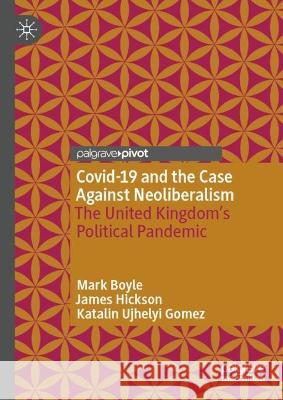COVID-19 and the Case Against Neoliberalism: The United Kingdom’s Political Pandemic » książka
COVID-19 and the Case Against Neoliberalism: The United Kingdom’s Political Pandemic
ISBN-13: 9783031189340 / Angielski / Twarda / 2023 / 234 str.
COVID-19 and the Case Against Neoliberalism: The United Kingdom’s Political Pandemic
ISBN-13: 9783031189340 / Angielski / Twarda / 2023 / 234 str.
(netto: 172,90 VAT: 5%)
Najniższa cena z 30 dni: 173,46
ok. 22 dni roboczych
Bez gwarancji dostawy przed świętami
Darmowa dostawa!
This book seeks to better understand the meaning and implications of the UKs calamitous encounter with the COVID-19 global pandemic for the future of British neoliberalism.Construing COVID-19 as apoliticalpandemic and mobilising a novelapplied political philosophyapproach, the authors cultivate fresh intellectual resources, both analytical and normative, to better understand why the UK failed the COVID-19 test and how it might ‘fail forward’ so as to strengthen its resilience.COVID-19 they argue, has intercepted the UK government’s decades-long experimentation with neoliberalism at what appears to be a threshold moment in this model’s life course. Neoliberalism has served as a key progenitor of the country’s vulnerability: the pandemic has cruelly unveiled the failings of neoliberal logics and legacies which have placed the country at elevated risk and hampered its response. The pandemic in turn has attenuated underlying systemic maladies inherent in British neoliberalism and served as a great disruptor and potential accelerant of history; a consequential episode in the tumultuous life of this politico-economic model.To meaningfully ‘build back better’, a true renaissance of social democracy is needed. Drawing upon the neorepublican tradition of political philosophy, the authors confront neoliberalism’s hegemonic but parochial concept of human freedom asnon-interferenceand place the neorepublican idea of freedom asnon-dominationin the service of building a new UK social contract.This book will be of interest to political philosophers, political geographers, medical sociologists, public-health scholars, and epidemiologists, to stakeholders engaged in the public inquiry processes now gathering momentum globally and to architects of build back better programmes, especially in western advanced capitalist economies.
This book seeks to better understand the meaning and implications of the UKs calamitous encounter with the COVID-19 global pandemic for the future of British neoliberalism.Construing COVID-19 as a political pandemic and mobilising a novel applied political philosophy approach, the authors cultivate fresh intellectual resources, both analytical and normative, to better understand why the UK failed the COVID-19 test and how it might ‘fail forward’ so as to strengthen its resilience. COVID-19 they argue, has intercepted the UK government’s decades-long experimentation with neoliberalism at what appears to be a threshold moment in this model’s life course. Neoliberalism has served as a key progenitor of the country’s vulnerability: the pandemic has cruelly unveiled the failings of neoliberal logics and legacies which have placed the country at elevated risk and hampered its response. The pandemic in turn has attenuated underlying systemic maladies inherent in British neoliberalism and served as a great disruptor and potential accelerant of history; a consequential episode in the tumultuous life of this politico-economic model. To meaningfully ‘build back better’, a true renaissance of social democracy is needed. Drawing upon the neorepublican tradition of political philosophy, the authors confront neoliberalism’s hegemonic but parochial concept of human freedom as non-interference and place the neorepublican idea of freedom as non-domination in the service of building a new UK social contract.This book will be of interest to political philosophers, political geographers, medical sociologists, public-health scholars, and epidemiologists, to stakeholders engaged in the public inquiry processes now gathering momentum globally and to architects of build back better programmes, especially in western advanced capitalist economies.











